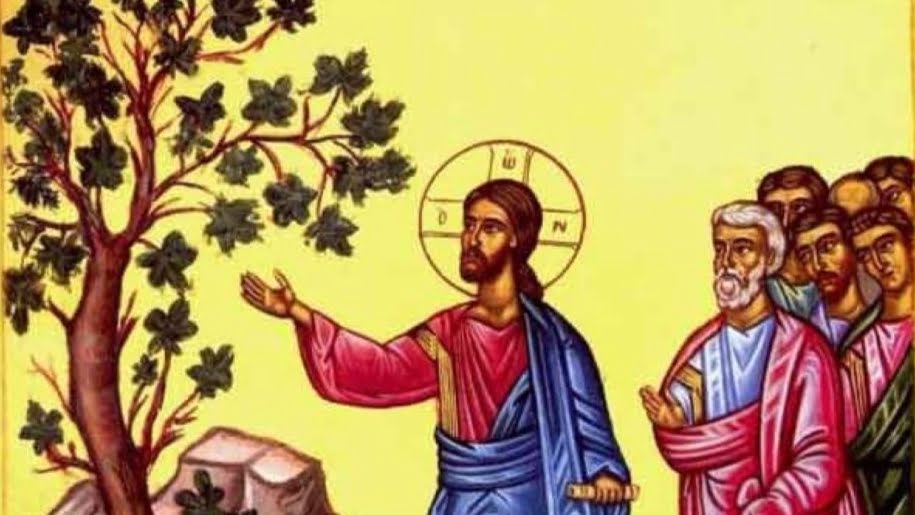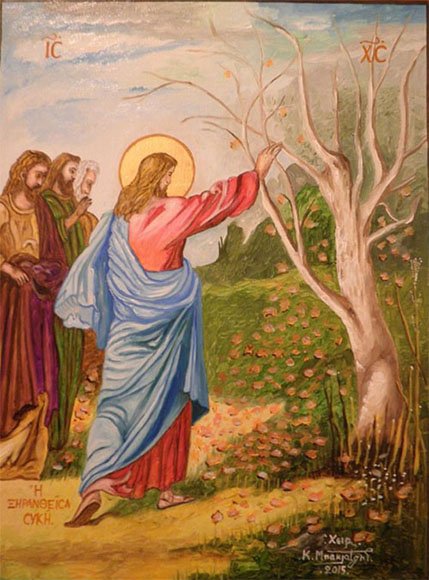POPE BENEDICT XVI ON THE 3RD SUNDAY OF LENT C

ANGELUS
St Peter’s Square
3rd Sunday of Lent C, 7 March 2010
Dear Brothers and Sisters,
The Liturgy of this Third Sunday of Lent presents to us the topic of conversion. In the First Reading from the Book of Exodus, Moses, while tending his flock, sees a burning bush that is not consumed by the flames. He goes closer to look at this miracle when a voice calls him by name and, reminding him of his unworthiness, orders him to take off his sandals because that place is holy. The voice says to him, “I am the God of your father, the God of Abraham, the God of Isaac, the God of Jacob”. And he adds, “I am who am” (Ex 3: 6a, 14). God likewise shows himself in various ways in each of our lives. To be able to recognize his presence, however, we must approach him with an awareness of our wretchedness and with deep respect. Otherwise we would make ourselves incapable of encountering him and entering into communion with him. As the Apostle Paul writes, this event is also recounted as a warning to us: it reminds us that God does not reveal himself to those in whom are entrenched self-sufficiency and frivolity but rather to those who are poor and humble before him.
In today’s Gospel passage, Jesus is questioned on certain distressing events: the killing of several Galileans in the temple, on the orders of Pontius Pilate, and the collapse of a tower on some passersby (cf. Lk 13: 1-5). In the face of the easy conclusion of considering evil as an effect of divine punishment, Jesus restores the true image of God who is good and cannot desire evil. And guarding us against believing that misfortunes are the immediate effect of the personal sins of those whom they afflict, says: “Do you think that these Galileans were worse sinners than all the other Galileans, because they suffered thus? I tell you, No; but unless you repent you will all likewise perish” (Lk 13: 2-3). Jesus asks us interpret these events differently, putting them in the perspective of conversion: misfortunes, sorrowful events must not awaken curiosity in us or the quest for presumed sins; instead they must be opportunities for reflection, in order to overcome the illusion of being able to live without God and to reinforce, with the Lord’s help, the commitment to change our way of life. With regard to sin, God shows himself to be full of mercy and never fails to remind sinners to avoid evil, to grow in love for him and to offer practical help to our neighbour in need, to live the joy of grace and not to go towards eternal death. However, the possibility of conversion demands that we learn to read the events of life in the perspective of faith, animated, that is, by holy fear of God. In the presence of suffering and bereavement, the true wisdom is to let ourselves be called into question by the precarious state of existence and to see human history with the eyes of God who, desiring always and only the good of his children, through an inscrutable design of his love sometimes permits us to be tried by suffering in order to lead us to a greater good.
Dear friends, let us pray Mary Most Holy, who accompanies us on our Lenten journey, that she may help every Christian to return to the Lord with his whole heart. May she sustain our firm decision to renounce evil and to accept the will of God in our lives with faith.
Source: https://www.vatican.va/content/benedict-xvi/en/angelus/2010/documents/hf_ben-xvi_ang_20100307.html
Emphasis mine.

ANGELUS
St Peter’s Square
3rd Sunday of Lent C, 11 March 2007
Dear Brothers and Sisters,
The passage of Luke’s Gospel that is proclaimed on this Third Sunday of Lent relates Jesus’ comments on two events of his time. The first: the uprising of some Galileans, which Pilate repressed with bloodshed. The second: the fall of the tower of Jerusalem, which claimed 18 victims. Two very distinct, tragic events: one caused by man, the other accidental.
According to the mentality of the time, people were inclined to think that the disgrace which struck the victims was due to some grave fault of their own. Jesus instead says: “Do you think that these Galileans were worse sinners than all the other Galileans…. Or those eighteen upon whom the tower in Siloam fell and killed them, do you think that they were worse offenders than all the others who dwelt in Jerusalem?” (Lk 13: 2, 4). And in both cases he concludes: “I tell you, No: but unless you repent you will all likewise perish” (13: 3, 5).
This, then, is the point to which Jesus wants to bring his listeners: the necessity for conversion. He does not propose it in legalistic terms, but rather in realistic ones, as the only adequate response to the events that place human certainties in crisis.
In the face of certain disgraces, he warns, it does no good to blame the victims. Rather, true wisdom allows one to question the precariousness of existence and to acquire an attitude of responsibility: to do penance and to improve our lives.
This is wisdom, this is the most effective response to evil on every level: interpersonal, social and international.
Christ invites us to respond to evil, first of all, with a serious examination of conscience and the commitment to purify our lives. Otherwise, he says, we will perish, we will all perish in the same way.
In effect, people and societies that live without ever questioning themselves have ruin as their only final destination. Conversion, on the other hand, while not preserving one from problems and misfortunes, allows one to face them in a different “way”.
First of all, it helps to prevent evil, disengaging some of its threats. And in any case, it allows one to overcome evil with good: if not always on a factual level, which sometimes is independent of our will, certainly on a spiritual level.
In summary: conversion overcomes the root of evil, which is sin, even if it cannot always avoid its consequences.
Let us pray to Mary Most Holy, who accompanies and sustains us on our Lenten journey, so that she may help every Christian to rediscover the greatness, I would say, the beauty, of conversion.
May she help us understand that doing penance and correcting one’s conduct is not simply moralism, but the most effective way to change oneself and society for the better.
An adage expresses it well: to light a candle is worth more than to curse the darkness.
Source: https://www.vatican.va/content/benedict-xvi/en/angelus/2007/documents/hf_ben-xvi_ang_20070311.html
Emphasis mine.
Stay updated: subscribe by email for free TO OUR NEW WEBSITE www.catholicsstrivingforholiness.org (PUT YOUR EMAIL IN THE SUBSCRIBE WIDGET).
We are also in www.fb.com/Catholicsstrivingforholiness. Kindly help more people in their Christian life by liking our page and inviting your family, friends and relatives to do so as well. Thanks in advance and God bless you and your loved ones! Fr. Rolly Arjonillo